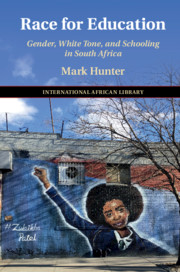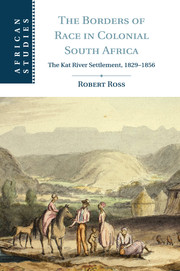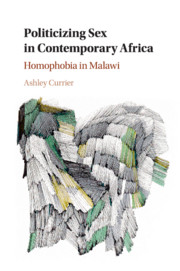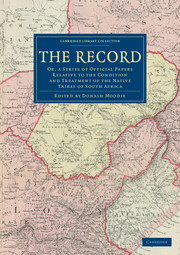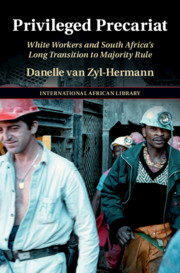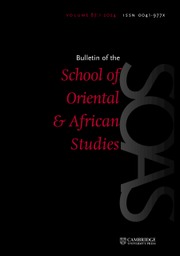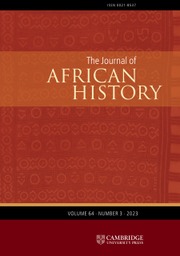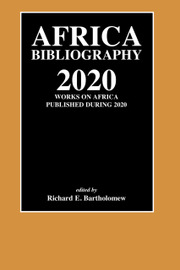Race for Education
Gender, White Tone, and Schooling in South Africa
Part of The International African Library
- Author: Mark Hunter, University of Toronto
- Date Published: January 2019
- availability: Available
- format: Hardback
- isbn: 9781108480529
Hardback
Other available formats:
Paperback, eBook
Looking for an inspection copy?
Please email [email protected] to enquire about an inspection copy of this book
-
Following the end of apartheid in 1994, the ANC government placed education at the centre of its plans to build a nonracial and more equitable society. Yet, by the 2010s a wave of student protests voiced demands for decolonised and affordable education. By following families and schools in Durban for nearly a decade, Mark Hunter sheds new light on South Africa's political transition and the global phenomenon of education marketisation. He rejects simple descriptions of the country's move from 'race to class apartheid' and reveals how 'white' phenotypic traits like skin colour retain value in the schooling system even as the multiracial middle class embraces prestigious linguistic and embodied practices the book calls 'white tone'. By illuminating the actions and choices of both white and black parents, Hunter provides a unique view on race, class and gender in a country emerging from a notorious system of institutionalised racism.
Read more- Sheds new light on the prevailing role that race has in South Africa's education system
- Offers a comprehensive understanding of schooling marketisation
- Provides a new original historically-rooted ethnography of education in South Africa and the country's transition from apartheid
Awards
- Winner, 2020 Joel Gregory Book Prize, Canadian Association of African Studies
Reviews & endorsements
'Mark Hunter has produced the definitive text on the sociology of urban education in South Africa … the book offers a novel account of how post-apartheid educational reforms have not led to the 'de-whitening' of the grammar of privilege … [and] to understandings of schooling and youth identity in globalised cities.' Aslam Fataar, Universiteit Stellenbosch, South Africa and former President of the South African Education Research Association
See more reviews'Hunter takes an issue at the centre of contemporary politics - schooling - and, through extensive ethnographic and archival research, elucidates the many inequalities at work while providing a deeply humanising portrait of those who face some of the greatest structural obstacles. This book sets a new standard for analysing the interplay of race and class in South Africa, one that is subtly attuned to gendered dynamics and linguistic formations.' Lynn M. Thomas, University of Washington
'[Hunter's] research challenges the common-sense view that desegregated schools would be the lynchpin of deracialisation. This is a fine and original study of the remaking of race with implications well beyond South Africa's borders.' Shireen Hassim, University of the Witwatersrand, Johannesburg
'Mark Hunter has written another outstanding and hugely insightful book. This book establishes a new reading of South Africa's society and urban spaces, looking in detail at the case of Durban. He brings a sophisticated spatial perspective to understand new forms of racialisation of the prospects of South Africa's children, and of the profound inequalities created by education.' Jennifer Robinson, University College London
'This is a subtle, thoughtful, carefully argued book about the foundations of the enduring power of 'white tone' in post-apartheid South Africa.' Jonny Steinberg, University of Oxford
'… the most important study of race and class written in a long time, one that could be read with great profit even by those who know little about South Africa.' Bill Freund, Social History
'The book adds to our growing understanding of the ways in which South Africa's 'transition' occurred in diverse ways in multiple institutional sites and spaces … an important contribution to urgent debates over the place of schooling in (re)making race and inequality.' Rachel E. Johnson, English Historical Review
'… the book combines rigorous historical research, forays into isiZulu linguistics and detailed ethnography. This makes for a readable book that provokes critical questions about the meanings of race, class formation and the value of education in unequal societies.' Christopher Webb, Journal of Southern African Studies
'Race for Education is a welcome addition to the literature on the history and politics of schooling and inequality in South Africa … the depth and breadth of the research and the window it provides into different worlds of schooling in the first two decades after apartheid-make this book essential reading for anyone looking for a deeper understanding of contemporary South African social dynamics.' Linda Chisholm, American Historical Review
Customer reviews
Not yet reviewed
Be the first to review
Review was not posted due to profanity
×Product details
- Date Published: January 2019
- format: Hardback
- isbn: 9781108480529
- length: 320 pages
- dimensions: 235 x 156 x 21 mm
- weight: 0.59kg
- availability: Available
Table of Contents
1. Introduction
Part I. Racial Modernism, 1950s and '60s:
2. 'Larney' and 'rough and tough' schools: the making of White Durban
3. Umlazi township and the gendered 'bond of education'
Part II. Marketised Assimilation, late 1970s–1990s:
4. The routes of schooling desegregation: protest, cooption, and marketised assimilation, 1976–2000
Part III. Schooling and Work after Apartheid:
5. From school to work: symbolic power and social networks
Part IV. Racialised Market, 2000s–:
6. 'What can you do for the school?' The racialised market, 2000s–
7. New families on the bluff: selling a child in the schooling market
8. Beneath the 'black tax' in Umlazi: class, family relations and schooling
9. Conclusions: hegemony on a school bus.
Sorry, this resource is locked
Please register or sign in to request access. If you are having problems accessing these resources please email [email protected]
Register Sign in» Proceed
You are now leaving the Cambridge University Press website. Your eBook purchase and download will be completed by our partner www.ebooks.com. Please see the permission section of the www.ebooks.com catalogue page for details of the print & copy limits on our eBooks.
Continue ×Are you sure you want to delete your account?
This cannot be undone.
Thank you for your feedback which will help us improve our service.
If you requested a response, we will make sure to get back to you shortly.
×
